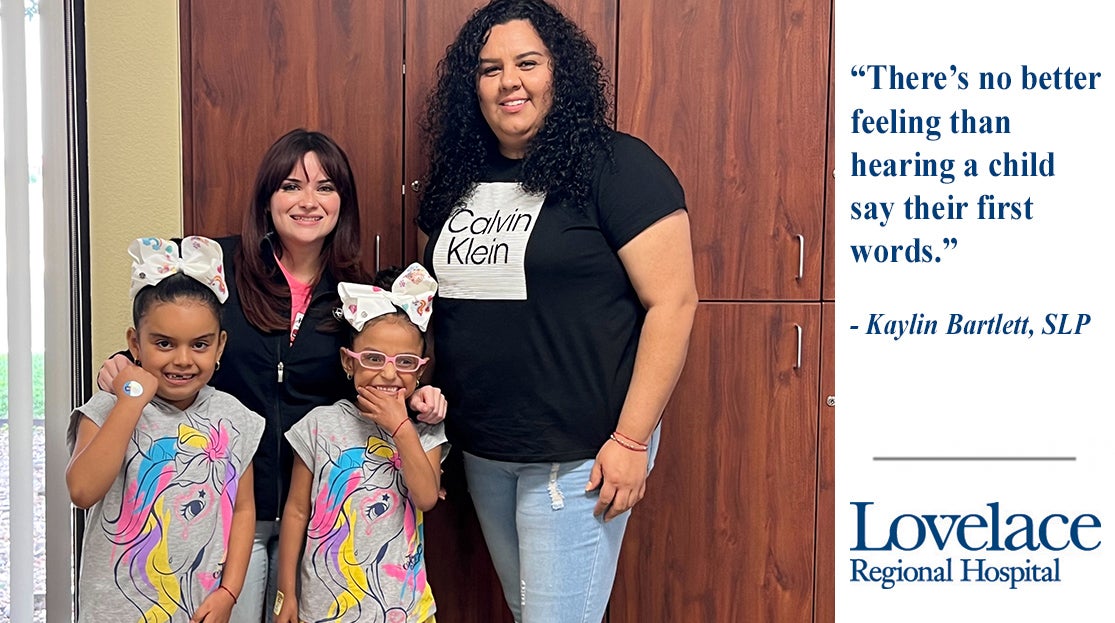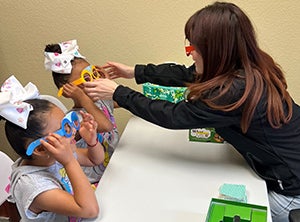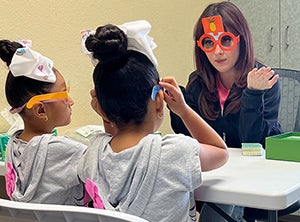
Azucena Medina knew that her five-year-old daughter Alanys would need specialized care to assist her development.
Born at 24 weeks gestation, Alanys has developmental delays that include speech and eating difficulties. Alanys is also on the autism spectrum, which complicates matters further.
“I still have trouble understanding what she says,” said Medina, a 32-year-old stay-at-home mom in Roswell. “But she has a larger vocabulary now and knows a lot of short words. While we may have a long way to go, she is saying those words very clearly so I can understand.”
Alanys developed the habit of “pocketing” her food, meaning she held the food in her mouth and sucked on it. The most common reason for pocketing food is the lack of sensory awareness and/or tongue coordination to fully chew and swallow certain foods. Because she did not chew and swallow much of her food, she received supplemental nutrition with Pediasure.
The improvements Alanys has shown so far are a result of the therapy sessions with Kaylin Bartlett, SLP, a medical speech-language provider at Lovelace Regional Hospital.
“What motivates me is getting to see a patient’s progress in their everyday lives,” said Bartlett. “There is no better feeling than hearing a child say their first words, helping patients build healthy and safe eating habits, or helping Aphasia patients begin communicating with their families again.”
One day Medina decided to bring her six-year-old daughter Aholanys along to her sister’s therapy session. It was during that session that Bartlett noticed the speaking difficulties the older daughter Aholanys had as well.
“My six-year-old has a lot of trouble communicating,” said Medina. “She often doesn't understand what you're asking her or she doesn't know how to tell you what's going on. That’s why we’re working with Kaylin.”
Medina previously told the girls’ pediatrician that the older daughter had communication issues and that a referral to Bartlett was needed. When the referral was slow in happening, Bartlett stepped in by sending her assessment of Aholanys’ communication skills.
“That's why I like Kaylin because she helps us a lot, not only with the twice-weekly therapy sessions but by going above and beyond for what’s best for the girls,” said Medina.
Bartlett fully embraces her calling to be a speech-language pathologist.
“Through speech therapy, I am able to build relationships with my patients and be a part of their journey in regaining or learning new skills that will aid them in their everyday lives.”
Speech and eating exercises
 According to Medina, Bartlett uses many different techniques with the girls.
According to Medina, Bartlett uses many different techniques with the girls.
“For example, she reads books to them and then asks them questions about what she read. She also asks the girls to repeat certain words and phrases, which are essentially exercises for their mouths. This is very helpful for my five-year-old because of her weak jaw muscles.”
As for eating exercises, the group will often go on picnics to try different foods, as a change of location is sometimes needed to keep the girls interested.
 “With my five-year-old’s autism, sometimes she doesn’t like to cooperate,” said Medina. “Kaylin is very flexible and knows that if one environment doesn’t work, let’s try another. It’s just another example of her going ‘above and beyond.’”
“With my five-year-old’s autism, sometimes she doesn’t like to cooperate,” said Medina. “Kaylin is very flexible and knows that if one environment doesn’t work, let’s try another. It’s just another example of her going ‘above and beyond.’”
Bartlett uses many educational methods in her sessions, including games, in order to teach both the participants and the parents.
“Many games, especially the one in these photos, can be used for a variety of language tasks,” said Bartlett. “The participants learn how to take turns, name objects, understand and describe the function of objects and generate sentences with a specific word.”
Bartlett also gets parents involved with the sessions.
“One of my favorite things about using games and toys in therapy is showing parents how to use everyday objects to create language opportunities,” said Bartlett. “The parents can adjust the complexity of the game based on each child's specific needs.”
Medina said that Bartlett will also give instructions to the parents when she assigns homework.
“She tells the girls what their homework will be and then makes a point to tell me as well,” said Medina. “This shows the girls that the homework is important and it gives me the opportunity to ask questions about the homework. Kaylin does a great job explaining everything to me.”
Encouraging results
Since they started regular sessions with Bartlett, Medina has seen notable improvements with the girls.
“To be honest with you,” Medina explained, “every time that we go to a session the girls pick up something new, like brushing their teeth better or trying new foods. I have shown them how to eat with a spoon or peel an orange, but they don’t try it with me. But it’s fun for them to visit Kaylin and they try new things with her.”
Alanys is now chewing more and trying new foods. “She still has a weak jaw and she gets tired when chewing dense foods like meat, but she is eating more,” Medina explained.
“Kaylin has such a sweet personality but also tries to challenge the girls to try something new. She has been a really great support for the girls and for me. Working with her has been wonderful and so helpful for my girls.”
For more information or to schedule an appointment with one of our speech therapists, call Lovelace Regional Hospital Outpatient Rehabilitation at 575.625.3372.




